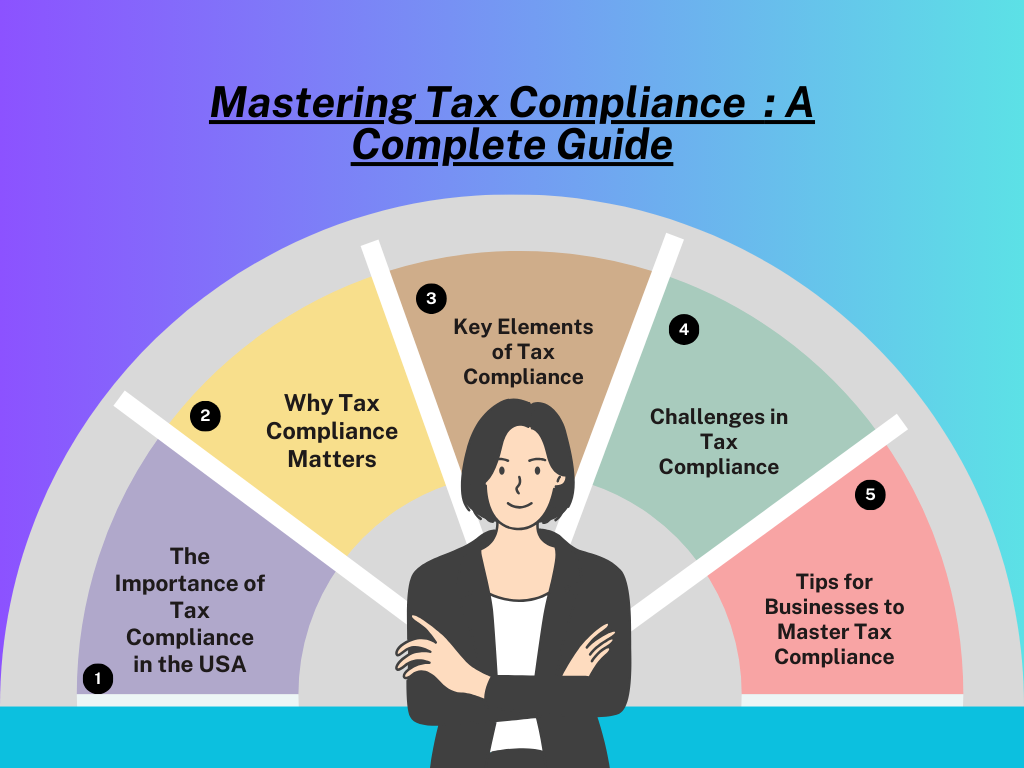Mastering Tax Compliance: 10 Proven Strategies for Success in 2025
The Importance of Mastering Tax Compliance in the USA
Mastering tax compliance is an essential responsibility for individuals and businesses alike. The Internal Revenue Service (IRS) enforces strict guidelines to ensure taxpayers meet their obligations. Failing to comply with these regulations can lead to penalties, audits, or legal consequences.
Mastering tax compliance involves more than just submitting returns; it requires accurately reporting income, claiming deductions, and meeting payment deadlines. Whether you’re an individual filer or a corporation, understanding these requirements is the first step toward effectively navigating tax obligations.
Why Tax Compliance Matters
- Legal Obligation: Every taxpayer in the U.S. is legally required to file and pay taxes.
- Avoiding Penalties: Late filings or errors can result in hefty fines.
- Building Credibility: For businesses, compliance establishes trust with stakeholders and investors.
Being proactive with tax compliance can save you time, money, and potential legal trouble. Let’s explore the key elements of mastering it.
Key Elements of Tax Compliance
Understanding the fundamentals of tax compliance is crucial to avoid missteps. From knowing your tax bracket to keeping detailed financial records, preparation is everything.
1. Understanding Tax Brackets and Rates
Tax brackets determine how much income tax you owe. In the U.S., the system is progressive, meaning higher earners pay a larger percentage of their income in taxes. Keeping track of changes to these rates ensures you’re not caught off guard.
Actionable Tips:
- Consult the IRS website for updated brackets annually.
- Use tax software to estimate your liability.
2. Filing Accurate Tax Returns
Errors in your tax return can delay refunds or trigger audits. Ensure all income sources are accounted for and that deductions and credits are accurately applied.
Common Mistakes to Avoid:
- Omitting income from freelance work.
- Miscalculating deductions.
- Forgetting to include dependents or marital status changes.
3. Record-Keeping for Tax Compliance
Maintaining thorough records simplifies tax filing and protects you during audits. Essential documents include:
- W-2 or 1099 forms.
- Receipts for deductible expenses.
- Bank statements and investment records.
Best Practices:
- Use digital tools like QuickBooks or Expensify.
- Organize documents by category and year.

Challenges in Tax Compliance
Despite your best efforts, mastering tax compliance can be challenging. Common hurdles include navigating complex tax laws, staying updated on changes, and managing paperwork.
1. Navigating Complex Tax Laws
The U.S. tax code is vast and frequently updated. Staying compliant requires a solid understanding of both federal and state laws.
Solutions:
- Hire a certified tax professional.
- Attend tax seminars or workshops.
2. Managing Deadlines
Missing tax deadlines can lead to penalties or interest charges. The IRS requires timely filing and payment of taxes.
How to Stay On Top of Deadlines:
- Set calendar reminders for key dates.
- opt for early filing to avoid last-minute stress.
3. Adapting to Tax Law Changes
Tax reforms can impact deductions, credits, and income thresholds. Keeping up with these changes is crucial for compliance.
Where to Stay Informed:
- Subscribe to IRS newsletters.
- Follow financial news outlets.
Tips for Businesses to Master Tax Compliance
Businesses face unique tax compliance challenges, from payroll taxes to quarterly filings. Here’s how to navigate these effectively.
1. Automate Tax Calculations
Manual tax calculations can be error-prone and time-consuming. Automated solutions streamline this process.
Recommended Tools:
- TurboTax Business.
- ADP Payroll services.
2. Separate Business and Personal Finances
Mixing finances complicates tax filing and can raise red flags during audits. Open separate bank accounts and credit cards for your business.
3. Claim All Eligible Deductions
Deductions reduce taxable income, but many businesses overlook them. Common deductions include:
- Office expenses.
- Employee benefits.
- Business travel costs.
Conclusion
Mastering tax compliance is a critical skill for individuals and businesses in the U.S. By understanding the fundamentals, staying informed about changes, and leveraging tools or professional help, you can navigate the complexities with confidence.
FAQs:
- What is tax compliance?
Tax compliance involves adhering to laws and regulations for filing and paying taxes accurately and on time. - What happens if I miss a tax deadline?
Missing deadlines can result in penalties, interest charges, or legal action by the IRS. - Are there tools to simplify tax compliance?
Yes, tools like TurboTax and QuickBooks can automate calculations and record-keeping. - How can businesses stay tax compliant?
Businesses should separate finances, automate processes, and consult professionals for complex tax matters. - Why is record-keeping important for taxes?
Detailed records help ensure accurate filings and protect you during audits.


One Comment